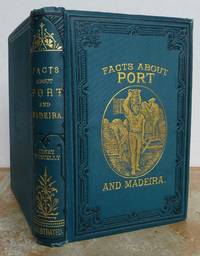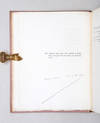

LEAVES OF GRASS
by Whitman Walt
- Used
- Hardcover
- first
- Condition
- See description
- Seller
-
Newburyport, Massachusetts, United States
Payment Methods Accepted
About This Item
“Always the champion of the common man, Whitman is both the poet and the prophet of democracy. The whole of LEAVES OF GRASS is imbued with the spirit of brotherhood and a pride in the democracy of the young American nation. In a sense, it is America’s second Declaration of Independence: that of 1776 was political, this of 1855 intellectual. ...The poems are saturated ‘with a vehemence of pride and audacity of freedom necessary to loosen the mind of still-to-be-formed America from the folds, the superstitions, and all the long, tenacious, and stifling anti-democratic authorities of Asiatic and European past’. To the young nation, only just becoming aware of an individual literary identity distinct from its European origins, Whitman’s message and his outspoken confidence came at a decisive moment.
“LEAVES OF GRASS was Whitman’s favorite child. From the time of its original publication...until the year of his death, he continued revising and enlarging it. If (his) reputation has fluctuated over the years and his position among, if indeed not at the head of, the list of great American poets was not assured until some time after his death, there was never any doubt of the matter in his own mind. ‘I know I am deathless’, he wrote. ‘Whether I come to my own today or in ten thousand or ten million years, I can cheerfully take it now, or with equal cheerfulness I can wait.’ Time has vindicated his conviction.” PMM
Synopsis
Leaves of Grass (1855) is a poetry collection by the American poet Walt Whitman. Among the poems in the collection are "Song of Myself," "I Sing the Body Electric," "Out of the Cradle Endlessly Rocking," and in later editions, Whitman's elegy to the assassinated President Abraham Lincoln, "When Lilacs Last in the Dooryard Bloom'd. " Whitman spent his entire life writing Leaves of Grass, revising it in several editions until his death. The first edition published in 1855 contained 12 poems on 95 pages. The final edition published contained almost 400 poems.
Reviews
Registered for copyright on 11 September 1856, the second edition of Leaves of Grass resulted from the continued surge of creativity that produced the first edition. The title page does not bear the author's name, but the verso page copyright is assigned to Walt Whitman (cf. Walter Whitman in the first edition). The little volume is bound in olive-green cloth; its front cover is blindstamped with leaves and berries and goldstamped "Leaves of Grass"; its back cover (without goldstamping) is identical. The spine is goldstamped with the title, leaf designs, and "I Greet You at the / Beginning of A / Great Career / R.W. Emerson." Unlike the slim outsized format of the first edition, this thick, squat volume measures approximately 6 2/3 by 3 3/16 inches and looks "like a fat hymn book" (Allen, Introduction xvi). The poems are set in well-leaded ten-point type, so that Whitman's characteristically long lines tend to overflow, sometimes three or four times. The New York Tribune advertised the one-dollar volume as "handy for pocket, table, or shelf" (Stern 121), so that when Whitman (in "Whoever You are Holding Me Now in Hand") challenges the reader to "carry me" "beneath your clothing," in breast or hip pocket, he imagines this volume as the embodiment of himself.
The volume's frontispiece is a photograph of Whitman in the "carpenter" pose. Its 32 numbered poems, including all 12 carried over from the first edition, are for the first time given titles. They are followed by "Leaves-Droppings," consisting of Emerson's encouraging but private 21 July 1855 letter of praise (previously reprinted in the 10 October 1855 New York Tribune and tipped into some late issues of the first edition); Whitman's "dear Friend and Master" reply, in effect, a prose essay; and "Opinions, 1855–56"—nine favorable and unfavorable reviews, including two anonymous self-reviews.
Despite its artistic merit, the volume was Whitman's greatest publishing failure. Its factual but unacknowledged publishers were Fowler and Wells, distributors of books and periodicals on phrenology, health reforms, and occasionally, belles lettres, to whose weekly Life Illustrated Whitman was then a contributor. Although reluctant to print the work, the firm advertised on 16 August in the same periodical that it was the principal distributor for this "neat pocket volume" in a stereotyped edition of 1,000 copies: "The author is still his own publisher, and Messrs. Fowler and Wells will again be his agents for the sale of the work" (qtd. in Stern 119). Despite Whitman's boast to Emerson that "these thirty-two Poems I stereotype to print several thousand copies of" (Comprehensive 730), sales were even poorer than those for the first edition; copies are now quite rare. Readers were embarrassed by such overtly sexual poems as "Spontaneous Me" and "A Woman Waits for Me," by the author's self-promotion, and by his unauthorized appropriation of Emerson's letter. Thus The Christian Examiner attacked the "foul work" ("Impious" 62) for its "pantheism and libidinousness" and its "self-applause" (63). Relations soured between poet and publisher. In 1857, when Whitman had 100 poems ready for the press, he declared that "Fowler & Wells are bad persons for me.—They retard my book very much" (Correspondence 1:44).
This edition is more programmatic than its predecessor. In a notebook jotting, Whitman defines the "Idea to pervade" the book as "Eligibility—I, you, any one . . . any being, no matter who" (Notebook 8). And in a characteristic mixture of semi-mystic populism and personal hauteur, he positions himself as the spokesman-poet of the American masses, telling Emerson that "A profound person can easily know more of the people than they know of themselves" (Comprehensive 733). His letter to Emerson—in effect an essay explaining his poetic intentions to the literary establishment in the critical 1856 election year—asserts that his poems are intended to unify the nation, "for the union of the parts of the body is not more necessary to this life than the union of These States is to their life" (Comprehensive 733). He proposes a new literature for America to inspire a free, democratic youth, aware of their singularity and their sexuality and destined to overcome personal and national corruption.
Like the authors of Fowler and Wells's manuals of reform and personal advice—many of whose ideas are interwoven into Whitman's poems—the persona often appears as a fatherly or brotherly counselor in matters physical, personal, or spiritual. At times his prescriptive tone borders on the prosaic, even the banal, and dilutes the intensity of some of the new poems. But Whitman was attempting to enlarge the poet-reader relationship by projecting himself as "the general human personality" (Bucke 63). And Whitman's contemporaries often found this hortatory tone to be congenial. Of this edition, Thoreau (while troubled by the edition's sensuality and its mixture of poetic wonders with "a thousand of brick") declared: "I do not believe that all the sermons, so-called, that have been preached in this land put together are equal to it for preaching" (Thoreau 68).
With the 1856 edition Whitman began his lifelong practice of adding new poems, reworking previously published poems, and reordering poems into different groupings. Thus the dozen poems of the first edition are here distributed in the following sequence: 1, 4, 32, 26, 7, 27, 19, 16, 22, 25, 29, and 6, beginning with "Song of Myself," here called "Poem of Walt Whitman, an American." He added, deleted, and combined lines. For example, he deleted the two-line curse against those who defile the human body at the end of the 1855 "I Sing the Body Electric" and added a 36-line quasi-anatomical catalogue. He also began the practice of removing over-used conjunctions and abandoned the idiosyncratic but rhetorically effective combination of dots, dashes, and conventional punctuation of the first edition in favor of a more standardized system.
The 1856 edition is more than an update; it is, in effect, a new work. Despite some poetic lapses, it is probably the most effectively designed of the six editions, and it is poetically dazzling. Its most impressive cluster of new poems, numbered 8 through 13, includes the following. The massive "By Blue Ontario's Shore," largely cannibalized from the 1855 prose Preface, is a paean to the present and future greatness of Americans ("It is I who am great, or to be great—it is you, or any one" [section 15]) and to the superb Whitman persona, the "equable," profound interpreter of the world and its symbols. "This Compost" evokes the persona's emotional interplay between his fear of death and his faith in the perpetuation of life. The short poem "To You [whoever you are]" is the persona's comradely outreach to his downtrodden fellows. "Crossing Brooklyn Ferry," with its stunning coloration and its musical and philosophical subtleties—the undisputed masterpiece of the second edition—pictures a deathless, empathic Whitman persona whose presence becomes palpable to generations of readers. "Song of the Open Road" presents the dynamic persona as a reader of the world's symbols proposing to lead the American masses out of their cramped existences into a continuum of transcendental selfhood. The group concludes with the sexually provocative "A Woman Waits for Me.''
(Log in or Create an Account first!)
Details
- Bookseller
- Buddenbrooks, Inc.
(US)
- Bookseller's Inventory #
- 32780
- Title
- LEAVES OF GRASS
- Author
- Whitman Walt
- Book Condition
- Used
- Binding
- Hardcover
- Publisher
- David McKay
- Place of Publication
- Philadelphia
- Date Published
- 1884
Terms of Sale
Buddenbrooks, Inc.
About the Seller
Buddenbrooks, Inc.
About Buddenbrooks, Inc.
Glossary
Some terminology that may be used in this description includes:
- Fine
- A book in fine condition exhibits no flaws. A fine condition book closely approaches As New condition, but may lack the...
- New
- A new book is a book previously not circulated to a buyer. Although a new book is typically free of any faults or defects, "new"...
- First Edition
- In book collecting, the first edition is the earliest published form of a book. A book may have more than one first edition in...
- Leaves
- Very generally, "leaves" refers to the pages of a book, as in the common phrase, "loose-leaf pages." A leaf is a single sheet...
- Tight
- Used to mean that the binding of a book has not been overly loosened by frequent use.
- Spine
- The outer portion of a book which covers the actual binding. The spine usually faces outward when a book is placed on a shelf....
- Cloth
- "Cloth-bound" generally refers to a hardcover book with cloth covering the outside of the book covers. The cloth is stretched...
- Gilt
- The decorative application of gold or gold coloring to a portion of a book on the spine, edges of the text block, or an inlay in...
- Top Edge Gilt
- Top edge gilt refers to the practice of applying gold or a gold-like finish to the top of the text block (the edges the pages...

